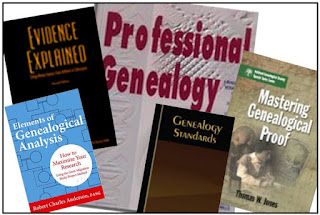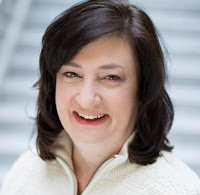This is part of my ongoing series on studying the Genealogical Proof Standard. There are links to the other posts in the series at the bottom of this article.
If you missed Studying Evidence Analysis, Part 1 you may want to review it, as it covers informal study options including books, articles, forums and websites. This article covers formal study options including courses, webinars and study groups. These vary in cost and format, such as online or in-person. Programs you can complete from home and free resources are included.
Formal Study Options:
1 - My very
favorite options for learning about analyzing evidence are the advanced methodology
courses at genealogical institutes. These courses go in-depth giving examples
and case studies for analyzing and correlating evidence from various types of
records. They are excellent for opening your mind to analysis alternatives you
may not have thought of, or even read about in other cases studies. They
features excellent instructors who teach by example. Here are three course
options:
Advanced Genealogical Methods
Coordinator:
Thomas W Jones, Ph.D., CG, CGL, FASG, FUGA, FNGS
Course description:
“Students in Advanced Genealogical Methods will learn how to use and assemble
evidence to rediscover ancestral origins, identities, and relationships that
have been forgotten in the passage of time. The course will address advanced
use of evidence from a variety of genealogical records and research in
populations for which the usual records are in short supply (including female,
enslaved, and impoverished ancestors). Students also will learn how to develop
written proof summaries to show their conclusions’ accuracy and create a
credible record of their findings for present and future generations of family
historians.”
Advanced Methodology and Evidence Analysis
Coordinator:
Judy G. Russell, J.D., CG,
CGL
Course description:
“Building on the basics taught in Genealogy Techniques and Technology and Intermediate Genealogy and Historical Studies, the course Advanced Methodology and Evidence Analysis is designed to develop and foster advanced skills by concentrating on problem-solving techniques. Its focus is on the proper application of the Genealogical Proof Standard to a wide variety of record types to solve complex research problems. Where beginning genealogy students need to learn what records exist to accurately identify their families, and intermediate genealogy students need to learn where records may be found, particularly those not readily available online, advanced genealogy students need to learn how to use records in ways that may be neither intuitive nor obvious to bridge the gaps left by time and record loss.”
Advanced Research Methods
Coordinator:
Thomas W Jones, Ph.D., CG, CGL, FASG, FUGA, FNGS
Course
description: “Participants will develop advanced genealogical research,
analysis, correlation and compilation skills. Hands-on activities, using
original records, will enhance this learning. Examples are drawn from American
states and colonies and European countries. Before the course begins
participants will complete two pre-course reading assignments. Four homework
assignments, providing opportunities for advanced skill development, are
optional.”
“Complex Evidence: What it is, How
it works, Why it matters”
“Proof Arguments: How and Why”
“Exhaustive Research, Evidence
Analysis, and Genealogical Proof”
“The Web of Evidence: Proof and
Disproof”
- Foundations
of Genealogical Research
- Problem-Solving
Techniques and Technology
- Evidence Evaluation and Documentation
- Forensic
Genealogical Research
- Professional
Genealogy
“The Importance of Context in
Record Analysis”
Presented by Barbara Vines Little,
CG, FNGS, FVGS
LIVE: Tuesday, February 16, 2016 / Recording will be posted online at the link above
Description: Source citations provide context for
the information we gather. Was the death date from a tombstone, a newspaper
obituary, a county history, a Bible record, or a death certificate? The best
citations tell us that the tombstone was contemporary with the death, the Bible
record was entered in the same hand and the same ink, the county history was
written a hundred and fifty years later, and the death certificate was signed
by an attending physician. The details provide background context that helps us
evaluate the validity of the information and suggests other avenues for
research. But this information only scratches the surface. A full evaluation of
any record’s context requires that we explore the complete content of the
document. We want to know the reason for the document’s existence; the social,
legal, and geographical context behind its creation; and what ancillary
documents were produced both before and after its creation.
“Complex
Evidence What it is, How it Works, Why it Matters”
presented by F. Warren
Bittner, CG
Description: The
genealogist’s goal is to establish identity and prove relationships.
Complex evidence is often the ONLY way to
do this. Follow a case study of clues from
multiple
sources to solve a problem.
5 - A free option
that provides an opportunity to study and discuss the concepts and practice of
evidence evaluation with other genealogists, are online study groups. There are
two different groups that are relevant to this topic.
GenProof Study Group– Small groups that study the concepts
in Mastering Genealogical
Proof by Thomas W. Jones. Individuals in these groups study the book chapter by chapter, complete the
exercises in the book, and meet online to discuss the concepts with each other and a mentor.
NGSQ Study Group -- The NGSQ Study Group
is an online study group that meets monthly
to study scholarly articles from the National Genealogical Society Quarterly. The purpose is to examine
the evidence and methodology used in the case study
and discuss it with other genealogists. There are several different groups that
meet at various times to
accommodate participants’ schedules.
6 – The Learning Center at FamilySearch.org
has a presentation by Thomas W. Jones entitled “Using Correlation to Reveal
Facts that No Record States.” You can download the course materials and view
the 45-minute presentation here.
7 - The absolute best teacher may be experience.
Once you have studied evidence analysis techniques start practicing them! Pull
out a piece of your research and analyze all of the evidence you have collected
using the Evidence Analysis Map inside the front cover of Evidence
Explained: Citing History Sources from Artifacts to Cyberspace by
Elizabeth Shown Mills (Baltimore: Genealogical Publishing Company, 2015). Analyze each piece of evidence, and then correlate it with the evidence you have from different sources. If this is difficult, go back and reread the resources in Studying Evidence Analysis, Part 1.
Comments welcome:
If you have suggestions for other methods for studying evidence analysis, please share them in the comments.
Note:
These are just ideas for you to add to your individual education plan as you choose. They are NOT meant to be a checklist where you have to read/study/participate in every option.











